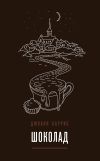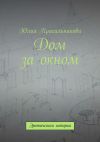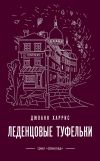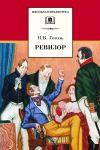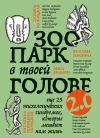Текст книги "Шоколад / Chocolat"

Автор книги: Джоанн Харрис
Жанр: Современная зарубежная литература, Современная проза
Возрастные ограничения: +16
сообщить о неприемлемом содержимом
Текущая страница: 12 (всего у книги 38 страниц) [доступный отрывок для чтения: 12 страниц]
I envy the table’s calm sense of place. It has been here a long time. It belongs.
Josephine helped me prepare dinner: a salad of green beans and tomatoes in spiced oil, red and black olives from the Thursday market stall, walnut bread, fresh basil from Narcisse, goat’s cheese, red wine from Bordeaux. We talked as we ate, but not about Paul-Marie Muscat. Instead I told her about us, Anouk and I, of the places we had seen, of the chocolaterie in Nice, of our time in New York just after Anouk was born and of the times before, of Paris, of Naples, of all the stopping-places Mother and I had made into temporary homes in our long flight across the world.
Tonight I want to recall only the bright things, the funny, the good things. There are too many sad thoughts in the air already. I put a white candle on the table to clear bad influences, and its scent is nostalgic, comforting. I remembered for Josephine the little canal at Ourcq, the Pantheon, the Place des Artistes, the lovely avenue of Unter den Linden, the Jersey ferry, Viennese pastries eaten in their hot papers on the street, the seafront at Juan-les-Pins, dancing in the streets in San Pedro. I watched her face lose a little of its set expression. I remembered how Mother sold a donkey to a farmer in a village near Rivoli, and how the creature kept finding us again, time after time, almost as far as Milan. Then the story of the flower-sellers in Lisbon, and how we left that city in a refrigerated florist’s van which delivered us half frozen four hours later by the hot white docks at Porto. She began to smile, then to laugh. There were times when we had money, Mother and I, and Europe was sunny and full of promise. I remembered them tonight; the Arab gentleman in the white limousine who serenaded Mother that day in San Remo, how we laughed and how happy she was, and how long we lived afterwards on the money he gave us.
“You’ve seen so much.” Her voice was envious and a little awed. “And you’re still so young.”
“I’m nearly the same age as you.”
She shook her head.
“I’m a thousand years old.” She gave a smile which was both sweet and wistful. “I’d like to be an adventurer,” she said. “To follow the sun with nothing but a single suitcase, to have no idea at all of where I might be tomorrow.”
“Believe me,” I told her gently, “you get tired. And after a while everywhere starts to look the same.”
She looked doubtful.
“Trust me,” I said. “I mean it.”
It isn’t quite true. Places all have their own characters, and returning to a city where you have lived before is like coming home to an old friend. But the people begin to look the same; the same faces recurring in cities a thousand miles apart, the same expressions. The flat, hostile stare of the official. The curious look of the peasant. The dull unsurprised faces of the tourists. The same lovers, mothers, beggars, cripples, vendors, joggers, children, policemen, taxi-drivers, pimps. After a while one begins to feel slightly paranoid, as if these people were secretly following from one town to another, changing clothes and faces but remaining essentially unchanged, going about their dull business with half an eye slyly cocked at us, the intruders.
At first one feels a kind of superiority. We are a race apart, we the travellers. We have seen, experienced, so much more than they. Content to run out their sad lives in an endless round of sleep-work-sleep, to tend their neat gardens, their identical suburban houses, their small dreams; we hold them in a little contempt. Then, after a while, comes envy. The first time it is almost funny; a sharp sudden sting which subsides nearly straight away. A woman in a park, bending over a child in a pushchair, both faces lit by something which is not the sun. Then comes the second time, the third; two young people on the seafront, arms intertwined; a group of office-girls on their lunchbreak, giggling over coffee and croissants… before long it is an almost constant ache. No, placesdo not lose their identity, however far one travels. It is the heart which begins to erode after a time. The face in the hotel mirror seems blurred some mornings, as if by too many casual looks. By ten the sheets will be laundered, the carpet swept. The names on the hotel registers change as we pass. We leave no trace as we pass on. Ghostlike, we cast no shadow.
I was roused from my thoughts by the imperious knocking at the front door. Josephine half-stood, fear starting in her eyes, both fists clenched against her ribs. It was what we had been waiting for; the meal, the conversation, merely a pretence at normality. I stood up.
“It’s OK,” I told her. “I won’t let him in.”
Her eyes were glazed with fear.
“I’m not talking to him,” she said in a low voice. “I can’t.”
“You may have to,” I answered. “But it’s all right. He can’t walk through walls.”
She gave a shaky smile.
“I don’t even want to hear his voice,” she said. “You don’t know what he’s like. He’ll say…”
I began to move towards the unlit shop area. “I know exactly what he’s like,” I said firmly. “And whatever you might think, he isn’t unique. The advantage of travel is that after a while you begin to realize that wherever you go most people aren’t really all that much different.”
“I just hate scenes,” murmured Josephine quietly as I put on the shop lights. “And I hate shouting.”
“Soon be over,” I said as the hammering began again. “Anouk can make you some chocolate.”
The door is on a safety-chain. I put it on when we arrived, being used to city security, though there was never a need for it until now. In the slice of light from the shop, Muscat’s face is congested with rage.
“Is my wife here?” His voice is thick and beery, his breath foul.
“Yes.” There is no reason for subterfuge. Better have it out now and show him where he stands. “I’m afraid she has left you, Monsieur Muscat. I offered to let her sleep here for a few nights, until things are sorted out. It seemed the best thing to do.”
I try to make my voice neutral, polite. I know his type. We met it a thousand times, Mother and I, in a thousand places. He gapes at me in stupefaction. Then the mean intelligence in his eyes takes over, his gaze narrows, his hands open to show that he is harmless, bewildered, ready to be amused. For a moment he seems almost charming. Then he takes a step closer towards the door. I can smell the rankness of his breath, like beer and smoke and sour anger.
“Madame Rocher.” His voice is soft, almost appealing. “I want you to tell that fat cow of mine to get her arse out of there right now, or I’ll be in to get her. And if you get in my way, you bra-burning bitch…” He rattles at the door. “Take the chain off.” He is smiling, wheedling, his rage burning from him with a faint chemical stink. “I said take the fucking chain off before I kick it off!”
His voice is womanish in anger. His squeal sounds like that of an angry pig. Very slowly I explain the situation to him. He swears and shrieks his frustration. He kicks at the door several times, making the hinges wince.
“If you break into my house, Monsieur Muscat,” I tell him evenly, “I’ll assume you’re a dangerous intruder. I keep a can of Contre-Attaq’ in my kitchen drawer, which I used to carry when I lived in Paris. I’ve tried it once or twice. It’s very effective.”
The threat calms him. I suspect he believes he alone has the right to make threats.
“You don’t understand,” he whines. “She’s my wife. I care for her. I don’t know what she’s been telling you, but…”
“What she’s been telling me doesn’t matter, Monsieur. The decision is hers. If I were you I’d stop making an exhibition of myself, and go home.”
“Fuck that!” His mouth is so close to the door that his spittle peppers me with hot, foul shrapnel. “This is your fault, you bitch. You started filling her head with all this emancipation bullshit.” He mimics Josephine’s voice in a savage falsetto. “Oh, it was all Vianne says this, and Vianne thinks that. Let me talk to her for just one minute and we’ll see what she says for a change.”
“I don’t think that’s…”
“It’s all right.” Josephine has come up behind me, softly, a cup of chocolate held between her folded hands as if to warm them. “I’ll have to talk to him, or he’ll never go away.”
I look at her. She is calmer, her eyes clear. I nod.
“OK.”
I step aside and Josephine goes to the door. Muscat begins to talk but she cuts him short, her voice surprisingly sharp and even.
“Paul. Just listen to me.” Her tone slices through his blustering, silencing him mid-phrase. “Go away. I’ve nothing more to say to you. All right?”
She is shaking, but her voice is calm and level. I feel a sudden rush of pride for her, and give her arm a reassuring squeeze. Muscat is silent for a moment. Then the wheedling tone returns to his voice, though I can still hear the rage behind it, like the buzz of interference on a distant radio signal.
“Jose,” he says softly, “this is stupid. Just come out and we can talk about it properly. You’re my wife, Jose. Doesn’t that deserve at least, another try?”
She shakes her head.
“Too late, Paul,” she tells him in a tone of finality. “I’m sorry.”
Then she shut the door very gently, very firmly, and though he hammered on it for several minutes longer, swearing and cajoling and threatening by turns, even weeping as he became maudlin and began to believe his own fiction, we did not answer it again.
At midnight I heard him shouting outside, and a clod of earth hit the window with a dull thumping sound, leaving a smear of clay across the clear glass. I stood up to see what was happening and saw Muscat like a squat, malevolent goblin in the square below, his hands thrust deep into his pockets so that I could see the soft roll of his stomach above the waistband of his trousers. He looked drunk.
“You can’t stay in there for ever!” I saw a light go on in one of the windows behind him. “You’ll have to come out some time! And then, you bitches! And then!”
Automatically I forked his ill-wishing back at him with a quick flick of the fingers.
Avert. Evil spirit, get thee hence.
Another one of Mother’s ingrained reflexes. And yet it is surprising how much more secure I feel now. I lay calm and awake for a long time after that, listening to my daughter’s soft breathing and watching the random shifting shapes of moonlight through the leaves. I think I tried scrying again, looking in the moving patterns for a sign, a word of reassurance… At night such things are easier to believe, with the Black Man standing watch outside and the weathervane shrilling cri-criii at the top of the church tower. But I saw nothing, felt nothing, and finally fell asleep once more and dreamed of Reynaud standing at the foot of an old man’s hospital bed with a cross in one hand and a box of matches in the other.
24
Sunday, March 9
Armande came in early this morning for gossip and chocolate. Wearing a new blonde-straw hat decorated with a red ribbon she looked fresher and more vital than she appeared yesterday. The cane which she has taken to carrying is an affectation; tied with a bright red bow it looks like a little flag of defiance. She ordered chocolat viennois and a ‘slice of my black-and-white layer cake and sat down comfortably on a stool. Josephine, who is helping me in the shop for a few days until she decides what to do next, watched with a little apprehension from the kitchen.
“I heard there was some fuss last night,” said Armande in her brusque way. The kindness in her bright black eyes redeems her forwardness. “That lout Muscat, I heard, out here yelling and carrying on.”
I explained as blandly as I could. Armande listened appreciatively.
“I only wonder why she didn’t leave him years ago,” she said when I had finished. “His father was just as bad. Too free with their opinions, both of them. And with their hands.” She nodded cheerily at Josephine, standing in the doorway with a pot of hot milk in one hand. “Always knew you’d see sense one day, girl,” she said. “Don’t you let anyone talk you out of it now.”
Josephine smiled. “Don’t worry,” she said. “I won’t.”
We had more customers this morning in La Praline than we have had on any Sunday since Anouk and I moved in.
Guillaume turned up at lunchtime, with Anouk. In the excitement of the past couple of days I had only spoken to him a couple of times, but as he walked in I was struck by the abrupt change in him. Gone was his shrunken, diminished look. Now he walked with a jaunty step, and he was wearing a bright red scarf around his neck which gave him an almost dashing air. From the corner of my eye I saw a darkish blur at his feet. Pantoufle. Anouk ran past Guillaume, her satchel swinging carelessly, ducking under the counter to give me a kiss.
“Maman!” she bugled in my ear. “Guillaume’s found a dog!”
I turned to look, my arms still full of Anouk. Guillaume was standing beside the door, his face flushed. At his feet, a small brown-and-white mongrel, no more than a puppy, lolled adoringly.
“Shh, Anouk. It isn’t my dog.” Guillaume’s expression was a complex of pleasure and embarrassment. “He was by Les Marauds. I think maybe someone wanted to get rid of him.”
Anouk was feeding sugar lumps to the dog.
“Roux found him,” she piped. “Heard him crying down by the river. He told me so.”
“Oh? You saw Roux?”
Anouk nodded absently and tickled the dog, who rolled over with a happy snarl.
“He’s so cute,” she said. “Are you going to keep him?”
Guillaume smiled, a little sadly.
“I don’t think so, sweetheart. You know, after Charly-”
“But he’s lost, he hasn’t anywhere else – ”
“I’m sure there are plenty of people willing to give a nice little dog like this a good home.” Guillaume bent down and gently pulled the dog’s ears. “He’s a friendly little chap, full of life.”
Insistently: “What are you going to call him?”
Guillaume shook his head.
“I don’t think I’ll be keeping him for long enough for that, ma mie.”
Anouk gave me one of her comical looks, and I shook my head at her in silent warning.
“I thought perhaps you could put a card in the shop window,” said Guillaume, sitting down at the counter. “To see if anyone claims him, you know.”
I poured him a cup of mocha and set it down in front of him, with a couple of florentines on the side.
“Of course.” I smiled.
When I looked back a moment later, the dog was sitting on Guillaume’s knee, eating the florentines. Anouk looked at me and winked.
Narcisse had brought me a basket of endives from his nursery, and seeing Josephine, handed her a little bunch of scarlet anemones which he took from his coat pocket, muttering that they would cheer the place up a bit. Josephine blushed, but looked pleased and tried to thank him. Narcisse shuffled off, embarrassed, gruffly disclaiming.
After the kind came the curious. Word had spread during the sermon that Josephine Muscat had moved into La Praline, and there was a steady flow of visitors throughout the morning. Joline Drou and Caro Clairmont arrived in their spring twinsets and silk headscarves with an invitation to a fund-raising tea on Palm Sunday. Armande gave a delighted cackle on seeing them.
“My my, it’s the Sunday morning fashion parade!” she exclaimed.
Caro looked annoyed.
“You really shouldn’t be here, maman,” she said reproachfully. “You know what the doctor said, don’t you?”
“I do indeed!” replied Armande. “What’s wrong, aren’t I dying fast enough for you? Is that why you have to send that death’s-head on a stick to spoil my morning?”
Caro’s powdered cheeks reddened.
“Really, maman, you shouldn’t say things like – ”
“I’ll mind my mouth if you mind your business!” snapped Armande smartly, and Caro almost chipped the tiles with her high heels in her haste to leave.
Then, Denise Arnauld came to see if we needed any extra bread.
“Just in case,” she said, eyes gleaming with curiosity. “Seeing as now you have a guest, and everything.”
I assured her that if we needed bread, we knew where to come.
Then Charlotte Edouard, Lydie Perrin, Georges Dumoulin: one wanting an early birthday present; another details of the chocolate festival – such an original idea, madame; another had dropped a purse outside St Jerome’s and wondered whether I might have seen it. I kept Josephine behind the counter with one of my clean yellow aprons to protect her clothes from chocolate spillages, and she managed surprisingly well. She has taken pains with her appearance today. The red jumper and black skirt are neat and businesslike, the dark hair carefully secured with ribbon. Her smile is professional, her head high, and. though her eyes occasionally drift towards the open door in anxious expectation there is little in her bearing to suggest a woman in fear for herself or for her reputation.
“Brazen, that’s what she is,” hissed Joline Drou to Caro Clairmont as they passed the door in haste. “Quite brazen. When I think of what that poor man had to bear with…”
Josephine’s back was turned, but I saw her stiffen. A lull in conversation made Joline’s words very audible, and though Guillaume faked a coughing fit in order to cover them, I knew she had heard.
There was a small, embarrassed silence.
Then Armande spoke.
“Well, girl, you know, you’ve made it when those two disapprove,” she said briskly. “Welcome to the wrong side of the tracks!”
Josephine gave her a sharp glance of suspicion, then, as if reassured that the joke was not against her, she laughed. The sound was open, carefree; surprised, she brought her hand to her mouth as if to check that the laughter belonged to her. That made her laugh all the more, and the others laughed with her. We were still laughing when the doorbell chimed and Francis Reynaud came quietly into the shop.
“Monsieur le Cure.”
I saw her face change even before I saw him, becoming hostile and stupid, her hands returning to their accustomed position at the pit of her stomach.
Reynaud nodded gravely.
“Madame Muscat.” He placed special emphasis on the first word. “I was sorry not to see you in church this morning.”
Josephine muttered something graceless and inaudible. Reynaud took a step towards the counter and she half-turned as if to bolt into the kitchen, then thought better of it and turned to face him.
“That’s right, girl,” said Armande approvingly. “Don’t let him give you any of his jabber.” She faced Reynaud and gestured sternly with a piece of cake. “You let that girl alone, Francis. If anything, you should be giving her your blessing.”
Reynaud ignored her.
“Listen to me, ma fille,” he said earnestly. “We need to talk.” His eyes went with some distaste to the red good-luck sachet hanging by the door. “Not in here.”
Josephine shook her head.
“I’m sorry. There’s work to do. And I don’t want to listen to anything you have to say.”
Reynaud’s mouth set stubbornly.
“You have never needed the Church as much as you need it now.” A cold, rapid glance in my direction…“You have weakened. You have allowed others to lead you astray. The sanctity of the marriage vow – ”
Armande interrupted him again with a crow of derision. “The sanctity of the marriage vow? Where did you dig that one up? I would have thought that you of all people?”
“Please, Madame Voizin.” At last a trace of expression in his flat voice. His eyes are wintry. “I would be most appreciative if you would…”
“Speak as you were raised to,” snapped Armande. “That mother of yours never taught you to talk with a potato in your mouth, did she?” She gave a chuckle. “Pretending we’re better than the rest of us, are we? Forgot all about us at that fancy school?”
Reynaud stiffened. I could feel the tension coming from him. He has definitely lost weight in the past few weeks, his skin stretched like a tambourine’s across the dark hollows of his temples, the articulation of his jaw clearly visible beneath the meagre flesh. A lank diagonal of hair across his forehead gives him a slyly artless look; the rest is crisp-creased efficiency.
“Josephine.” His voice was gentle, compelling, excluding the rest of us as effectively as if they had been alone. “I know you want me to help you. I’ve talked to Paul-Marie. He says you’ve been under a lot of strain. He says…”
Josephine shook her head.
“Mon pere.” The blank expression had left her face and she was serene. “I know you mean well. But I’m not going to change my mind.”
“But the sacrament of marriage…” he looked agitated now, leaning forward against the counter with his face twisted in distress. His hands clutched at the padded surface as if for support. Another surreptitious glance at the bright sachet at the door. “I know you have been confused. Others have influenced you.” Meaningfully: “If only we could speak in private…”
“No.” Her voice was firm. “I’m staying here with Vianne.”
“For how long?” His voice registered dismay whilst trying for incredulity. “Madame Rocher may be your friend, Josephine, but she’s a businesswoman, she has a shop to run, a child to care for. How long will she tolerate a stranger in the house?”
This shot was more successful. I saw Josephine hesitate, the look of uncertainty back in her eyes. I’d seen it too often in my mother’s face to mistake it; that look of disbelief, of fear.
We don’t need anyone but each other. A fierce, remembered whisper in the hot dark of some anonymous hotel room. What the hell would we want anyone else for? Brave words, and if there were tears the darkness hid them. But I felt her shaking, almost imperceptibly, as she held me beneath the covers, like a woman in the throes of a hidden fever. Perhaps that was why she fled them, those kind men, kind women who wanted to befriend, to love, to understand her. We were contagious, fevered with mistrust, the pride we carried with us the last refuge of the unwanted.
“I’m offering Josephine a job here with me.” I made my voice sweet and brittle. “I’m going to need a lot of extra help if I’m to have time to prepare the chocolate festival for Easter.”
His look, finally unveiled, was stark with hatred.
“I’ll train her in the basics of chocolate-making,” I continued. “She can cover for me in the shop while I work in the back.”
Josephine was looking at me with an expression of hazy astonishment. I winked at her.
“She’ll be doing me a favour, and I’m sure the money will come in useful for her too,” I said smoothly. “And as for staying”– I spoke to her directly, fixing her eyes with mine – “Josephine you’re welcome to stay for as long as you like. It’s a pleasure to have you here.”
Armande cackled.
“So you see, mon pere,” she said gleefully. “You needn’t waste any more of your time. Everything seems to be going just fine without you.” She sipped chocolate with an air of concentrated naughtiness. “A drink of this might do you good,” she suggested. “You’re looking peaky, Francis. Been hitting the communion wine again, have you?”
He gave her a smile like a clenched fist.
“Very droll, Madame. It’s good that you haven’t lost your sense of humour.”
Then he turned smartly on his heels, and with a nod and a curt ‘Messieurs-Dames’ to the customers he was gone, like the polite Nazi in a bad war film.
Внимание! Это не конец книги.
Если начало книги вам понравилось, то полную версию можно приобрести у нашего партнёра - распространителя легального контента. Поддержите автора!Правообладателям!
Данное произведение размещено по согласованию с ООО "ЛитРес" (20% исходного текста). Если размещение книги нарушает чьи-либо права, то сообщите об этом.Читателям!
Оплатили, но не знаете что делать дальше?




